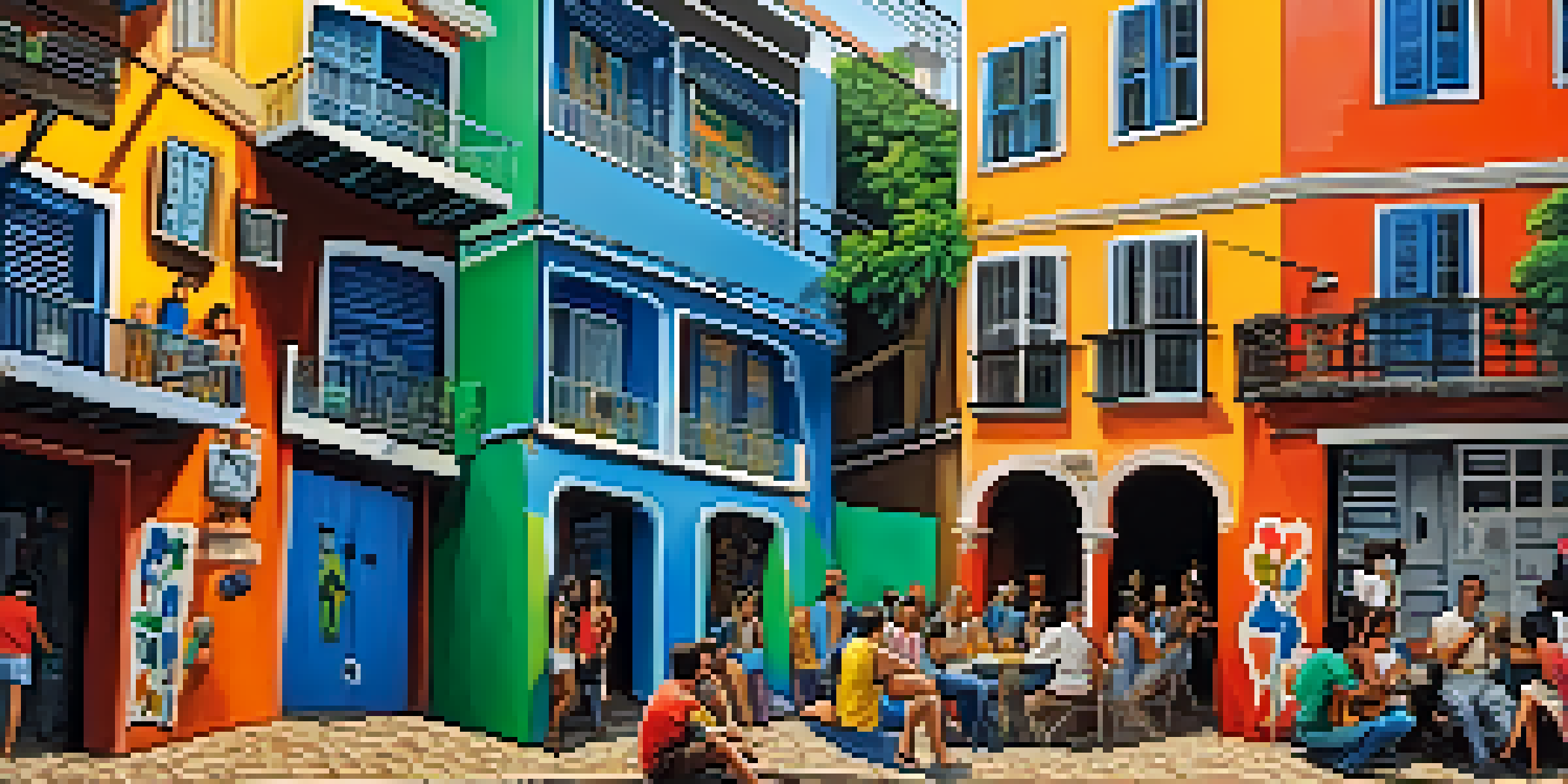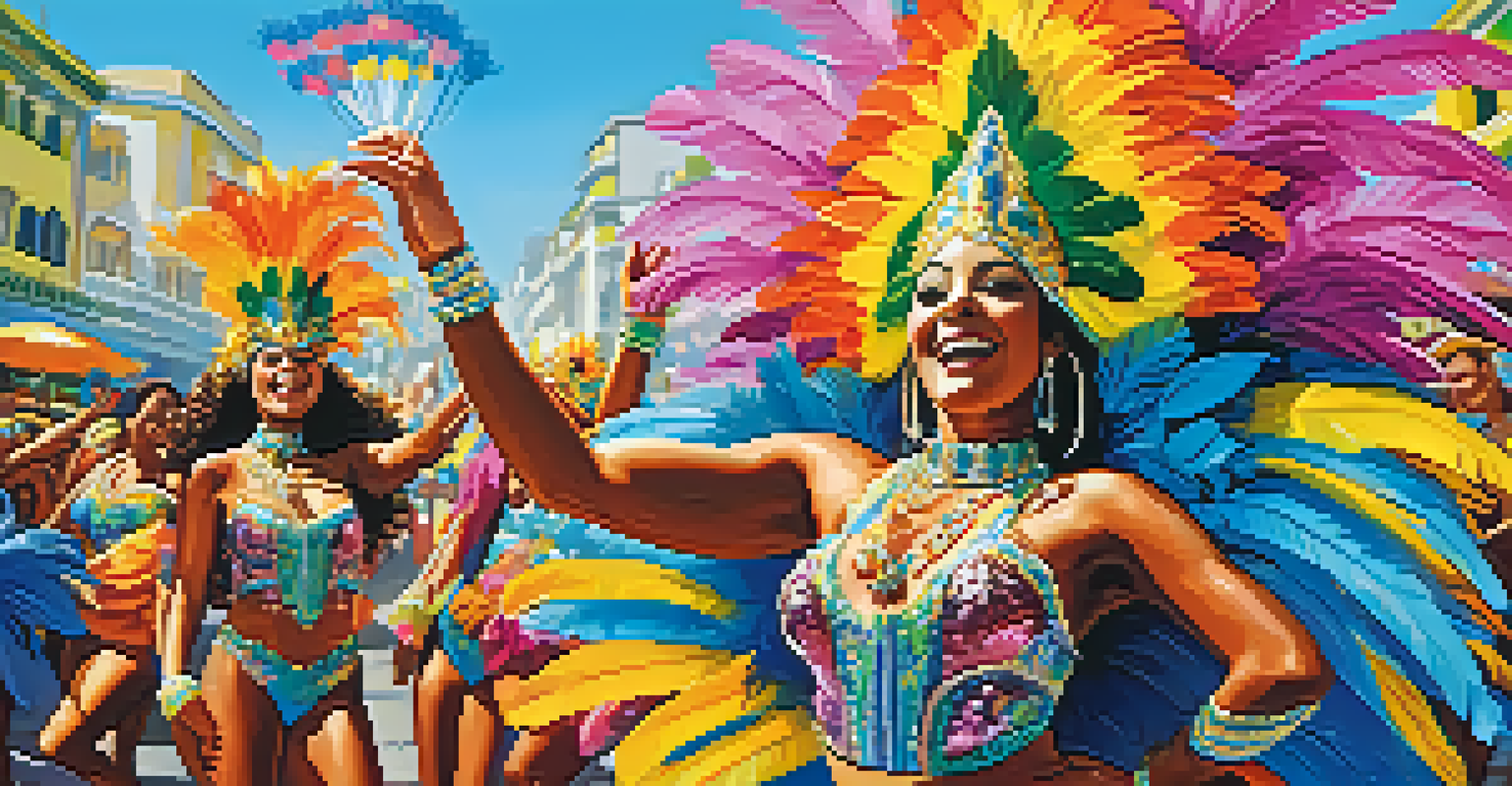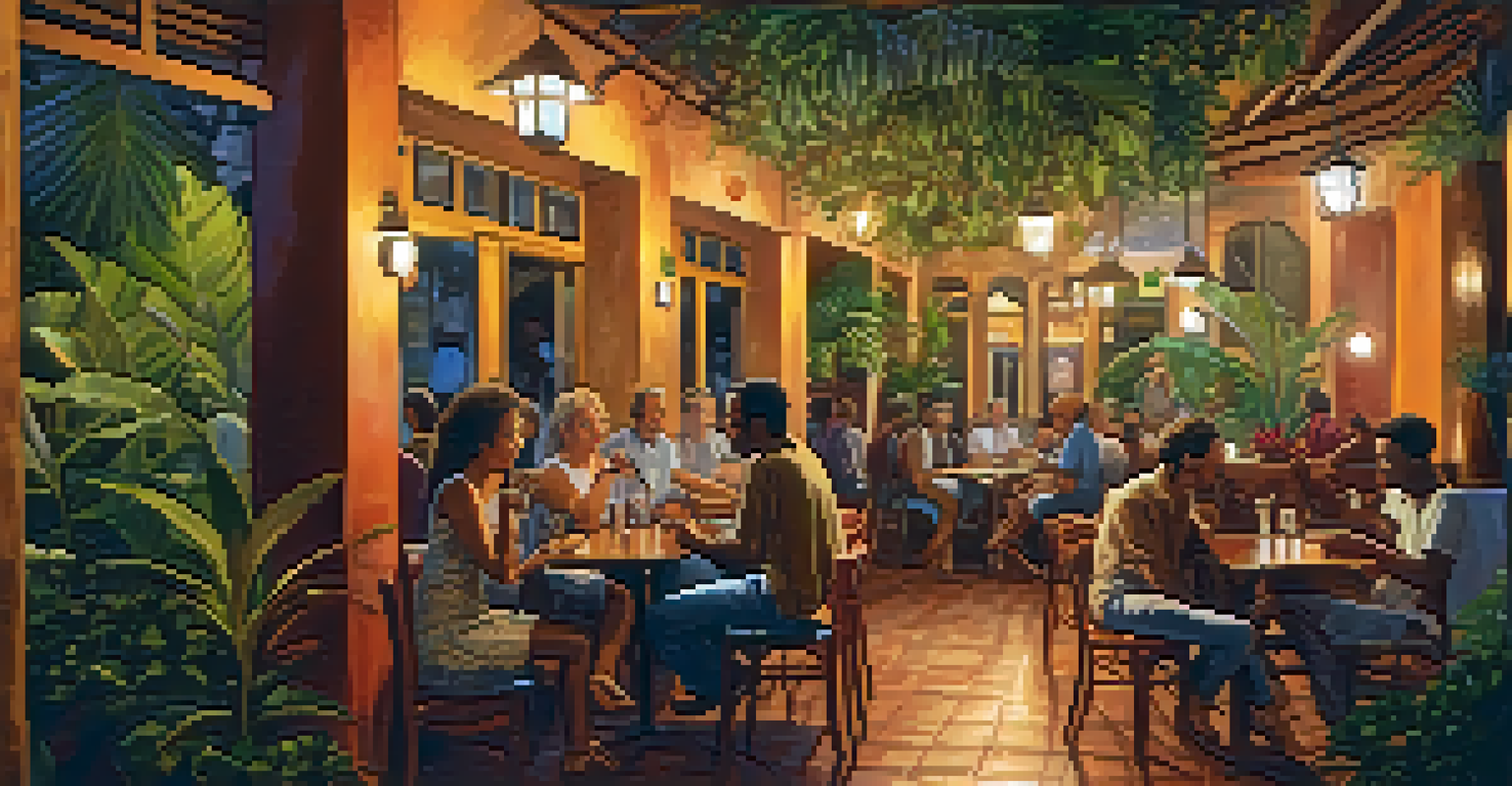Samba and Bossa Nova: Live Performances in Rio de Janeiro

The Rich History of Samba in Rio de Janeiro
Samba is more than just a genre of music; it's a cultural phenomenon that has roots deeply embedded in Brazilian history. Emerging from the African rhythms brought by enslaved people, Samba became a symbol of resistance and identity for many in Brazil. In Rio de Janeiro, it gained immense popularity in the early 20th century, evolving into a beloved genre that transcends social classes.
Samba is the rhythm of the Brazilian soul, a dance that speaks to the heart and connects people across generations.
The lively beats of Samba are often accompanied by vibrant dances, making it a feast for both the ears and the eyes. The annual Carnival in Rio is perhaps the most famous showcase of Samba, where schools compete in parades, showcasing dazzling costumes and exuberant performances. These events not only highlight the music but also foster a sense of community and cultural pride.
Today, Samba continues to thrive in Rio, with live performances held in various neighborhoods. From the intimate settings of local bars to grand stages during festivals, Samba keeps the spirit of Rio alive, inviting everyone to join in the rhythm and celebration.
Understanding Bossa Nova: A Smooth Musical Evolution
Bossa Nova, often described as a blend of Samba and jazz, emerged in the 1950s and quickly captured the hearts of many around the world. With its smooth melodies and soft rhythms, Bossa Nova conveys a sense of tranquility and sophistication, making it distinct from its more upbeat counterpart, Samba. It reflects the lifestyle and culture of Rio de Janeiro, often evoking images of sun-kissed beaches and gentle waves.

One of the most famous songs, 'The Girl from Ipanema,' showcases the genre's characteristic style and has been covered by countless artists globally. Bossa Nova's appeal lies in its simplicity and elegance, allowing performers to connect deeply with their audiences. This genre paved the way for Brazilian music to gain international recognition, influencing musicians far beyond its borders.
Samba's Cultural Significance
Samba emerged as a symbol of resistance and identity in Brazil, evolving into a beloved genre that fosters community and cultural pride.
In Rio, Bossa Nova is celebrated in numerous venues, from cozy cafes to larger concert halls. Live performances often create an intimate atmosphere, where listeners can experience the subtle nuances of the music and the emotions conveyed by the artists. This connection transforms a simple night out into a memorable cultural experience.
Iconic Venues for Live Samba and Bossa Nova in Rio
Rio de Janeiro boasts a plethora of venues that showcase the vibrant sounds of Samba and Bossa Nova. One of the most iconic places is the Carioca da Gema, a lively bar where locals and tourists alike come to dance and enjoy live music. The atmosphere is electric, filled with the sounds of percussion instruments and the laughter of people enjoying the rhythm of the night.
Bossa Nova is a little like a window through which you can see the essence of Brazil; its beauty, its rhythm, and its soul.
Another beloved venue is the Beco do Batman, a colorful alleyway in the heart of the Vila Madalena neighborhood. Here, street performers often play Bossa Nova, creating a backdrop of beautiful art and music. This fusion of culture draws visitors who want to immerse themselves in the local scene, making it a hotspot for both music lovers and art enthusiasts.
Additionally, the historic Teatro Municipal hosts performances that feature renowned artists in the world of Samba and Bossa Nova. The grandeur of the venue adds a layer of sophistication to the experience, allowing attendees to appreciate the music in a stunning setting. These venues not only provide entertainment but also contribute to the preservation of these rich musical traditions.
The Role of Festivals in Celebrating Samba and Bossa Nova
Festivals play a crucial role in celebrating the vibrant cultures of Samba and Bossa Nova in Rio de Janeiro. The Rio Carnival is perhaps the most famous festival, where Samba schools compete in dazzling parades that last for days. This event draws millions of visitors from around the world, showcasing the energy and passion of Brazilian music and dance.
Another notable event is the Festival Internacional de Bossa Nova, which gathers artists from various backgrounds to celebrate this smooth genre. With performances, workshops, and discussions, it highlights the importance of Bossa Nova in contemporary music. These festivals foster a sense of unity among musicians and fans, allowing for cultural exchange and collaboration.
Bossa Nova's Global Appeal
Bossa Nova blends Samba and jazz, captivating audiences worldwide with its smooth melodies and elegant style.
Through these celebrations, the spirit of Samba and Bossa Nova is kept alive, ensuring that new generations continue to appreciate and participate in these musical traditions. They serve as a reminder of the rich cultural heritage of Brazil, inviting everyone to join in the celebration of life through music.
Local Artists to Watch: The Future of Samba and Bossa Nova
As the music scene in Rio de Janeiro continues to evolve, new artists are emerging to carry the torch of Samba and Bossa Nova. These talented musicians often blend traditional sounds with modern influences, creating fresh takes on beloved genres. By doing so, they attract younger audiences while still honoring the roots of the music.
Artists like Liniker and the Caramelows have gained popularity by infusing elements of soul and funk into their work, showcasing the versatility of Samba. Their performances are vibrant and full of life, often leading to an engaging dialogue between the artist and the audience. This innovative approach keeps the music relevant and exciting in today's fast-paced world.
Bossa Nova is also seeing a resurgence, with new artists like Ana Frango Elétrico bringing a contemporary twist to the classic sound. Their ability to connect with listeners through heartfelt lyrics and smooth melodies is a testament to the enduring appeal of Bossa Nova. As these artists rise to prominence, they ensure that the legacy of Rio's musical heritage continues to thrive.
Experiencing Live Performances: Tips for Visitors
If you're planning to experience live Samba and Bossa Nova in Rio, there are a few tips to enhance your visit. First, check local event listings to find out which venues are hosting performances during your stay. Many bars and clubs offer live music almost every night, providing an opportunity to immerse yourself in the vibrant culture of the city.
When attending a performance, don’t hesitate to join in on the dance! Samba and Bossa Nova are all about participation, and locals will often encourage you to dance along. Even if you're not an expert, just moving to the rhythm is a great way to connect with the music and the people around you.
Impact of Festivals on Music
Festivals like Carnival and the Festival Internacional de Bossa Nova celebrate and preserve the rich traditions of Samba and Bossa Nova while fostering cultural exchange.
Lastly, consider the time of year you visit. While live performances happen year-round, festivals like Carnival offer a unique experience filled with energy and excitement. Regardless of when you go, embracing the local culture and enjoying the live music will create unforgettable memories in the heart of Rio de Janeiro.
The Lasting Impact of Samba and Bossa Nova on Global Music
Samba and Bossa Nova have had a profound impact on the global music scene, influencing countless artists and genres worldwide. The rhythmic complexity of Samba has inspired musicians in genres like jazz, funk, and pop, while Bossa Nova's smooth melodies have found their way into the hearts of listeners across the globe. This cultural exchange signifies the power of music to transcend borders and connect people.
Many renowned international artists, including Stan Getz and Joao Gilberto, have contributed to popularizing Bossa Nova outside Brazil. Their collaborations brought attention to the beauty of Brazilian music, leading to a broader appreciation of its unique qualities. This cross-pollination of styles continues to enrich the music landscape, creating a vibrant tapestry of sounds.

As new generations of musicians embrace these styles, the legacy of Samba and Bossa Nova lives on, ensuring that their influence will be felt for years to come. By celebrating and preserving these genres, we not only honor their origins but also pave the way for future innovation in music.